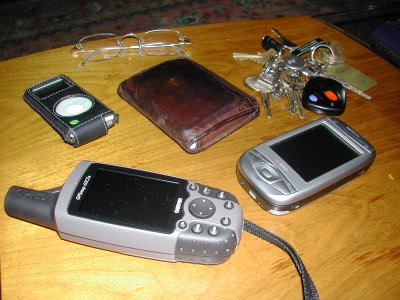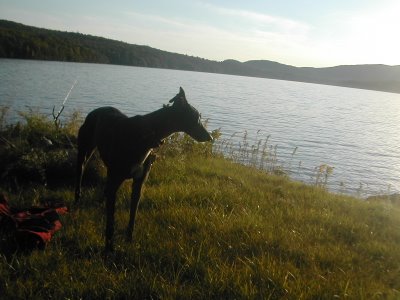
Less than this most of the time, actually. I do find myself carring around all of this "digital ephemera" many weekdays, when I'm carring my briefcase and laptop anyway and can throw these into the side compartment.
The fundamental and familiar mantra of "wallet, keys, glasses & phone" as I leave the door has been slightly amended, as I'm now occasionally adding a digital camera, iPod and GPS to the mix. My relatively ancient Nikon Coolpix 775 is responsible for this shot -- and therefore isn't pictured.
What isn't pictured is all of the cords, adapters, chargers, manuals and drivers that support this collection. Tucked into and around the desk in the library/office at home, stored in milk crates in the basements or stuffed into the nooks and crannies of my car and briefcase, those digital lifelines all feed the hungry power demands of these gadgets. Reading this article, describing the real-world demonstration of non-radiative energy transfer non-radiative power energy (NRPET) using resonance to wireless gadgets, gives me hope that at least some of those adapters and chargers might be a thing of the past.
If my electronics could just:
A) communicate using a combination of WiFi, GPRS, Bluetooth and satellite, which ever happens to be available
B) be kept charged using NRPET that is broadcast from a central power source
I'd be a very happy techie.
That central power source would of course be powered by hydropower, solar, biothermal, wind, tidal or some other renewable power source, to be reasonably green, of course. Ethanol, clean diesel, clean coal, fuel cells or biodiesel might fit the bill too. There's even switch grass, as the POTUS reminded us last January in the State of the Union address.
To see B come true, however, I'd need to live at least well into the next decade or retreat to some sort of Gene Roddenbury fantasia.
I bet my travel bags will weigh less, too.
Flights of purple-shaded futurism aside, we truly are much closer to living in the Jetson's world than I ever imagined we would be in 2006, as I think back to watching George, Jane, Judy, Elroy in the 80s.
The world's teenagers are video chatting and vlogging away on YouTube. Terabytes of data that touch upon every conceivable subjects is now available at the end of a blinking cursor and a "search" button on the browsers of handsets connected to high-speed wireless broadband. It's possible to click on POPUrls.com and see what's been elevated by the collective force of the online hive mind, constantly pushing the most pertinent or interesting meme to the fore.
It's a good thing there's still a place for Astro in this world, or in my case, Shadow.

2 comments:
I can't help but think that if we all just tried to use all of our mental capabilities, we wouldn't need such contraptions in our pockets. Wouldn't it be nice if we could just rely on our own clairvoyance instead of our PDAs? (Wow. I sound insane, don't I?)
As it happens, I think about that a lot. How much should I be able to remember and under what conditions should I be able to recall those memories?
One of my favorite authors, Neal Stephenson, wrapped his plot around a sort of semantic hack of the brain in Snow Crash. In a somewhat convoluted backstory regarding linguistics, he delved back into the transition from where all of human knowledge could be retained within an oral history passed from one generation to the next.
I think he placed the tipping point somewhere around the Sumerians, when someone had the bright idea to start scratching letters in wax tablets.
I suppose cave paintings by aboriginal peoples well before that qualify as some form of knowledge transfer as well, but the Sumerians were the point that Neal chose for when humanity started to build a global knowledge dump. I'll follow his lead.
A few millennia later, even an ambitiously curious chap like myself isn't likely to amass more than a tiny fraction what's out there to learn.
A smarter man than I once reminded that me that the more we learn, the less we know. That is, the more educated we become in a subject, the more we realize how much we don't know.
Even so, I was surprised to learn that increased rates of agnosticism correlate with higher levels of scientific achievement...quite a few atheist Nobel Laureates out there, as it turns out.
Maybe we all should have photographic memories and be able to calculate are position in space and time to within a meter on the planet's surface.
I, sadly, do not. I'm also not clairvoyant, nor possessed of any other forms of ESP, as far as I know.
It's a shame; Vegas and Monaco would be fun.
In the meantime, I'll stick with a mobile browser tuned to Google, an iPod stacked with my favorite podcasts and tunes and a GPS.
I probably sound crazy too. Call it too much turkey.
Post a Comment